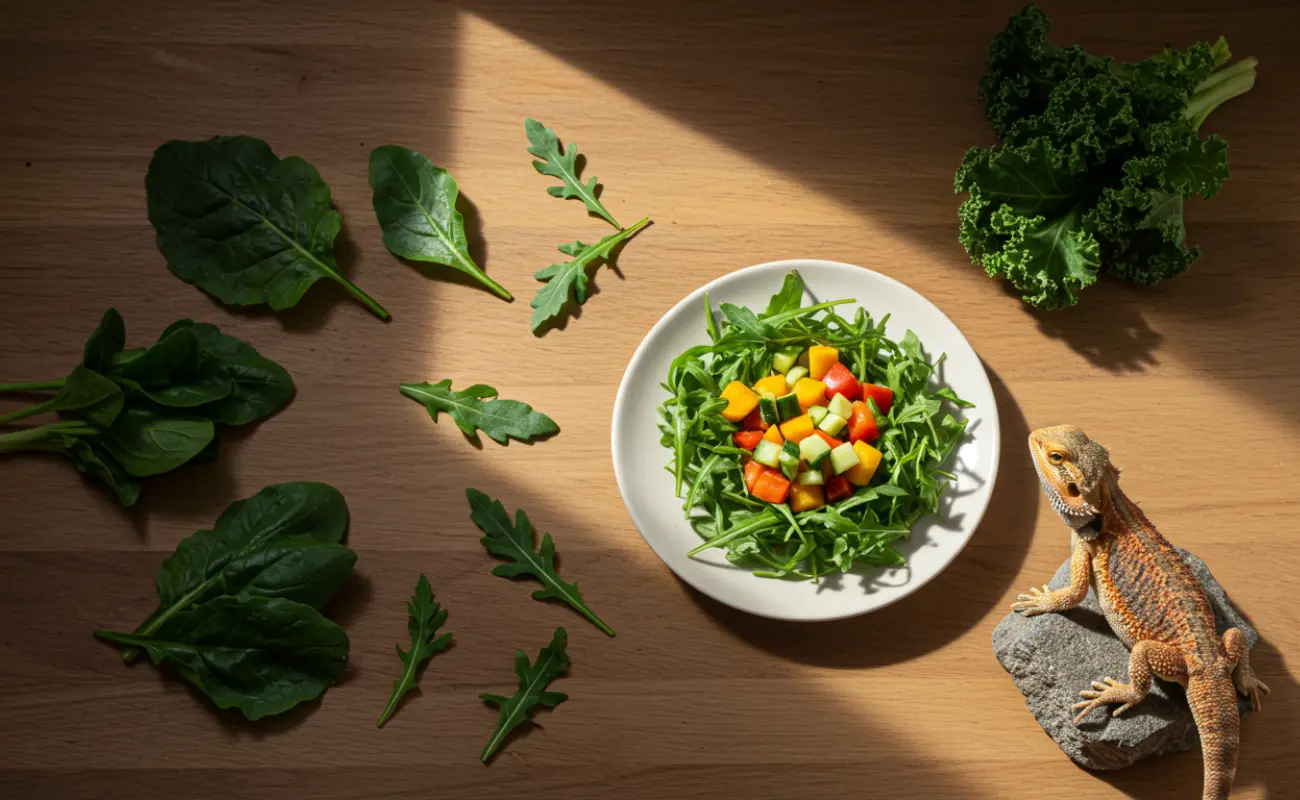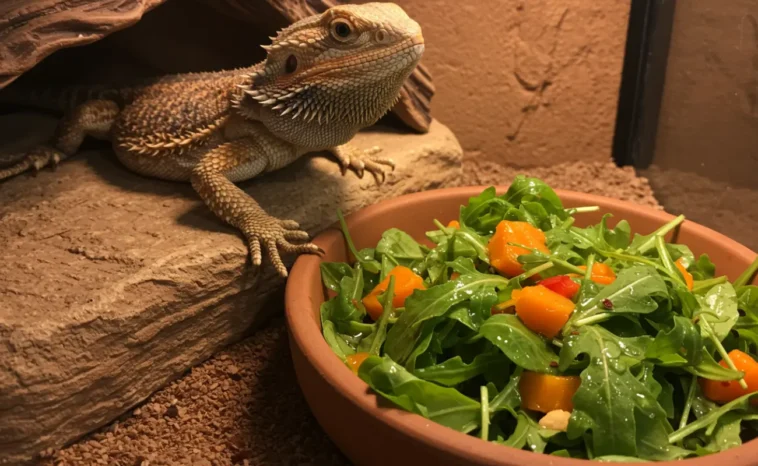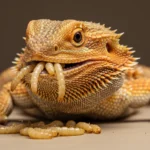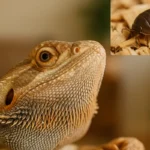Can bearded dragons have arugula?
If you’re a proud bearded dragon owner, you’ve likely found yourself scanning grocery store greens wondering: Can bearded dragons have arugula? With so much conflicting advice online, it’s hard to know what’s genuinely safe and nutritious for your scaly companion.
In this comprehensive guide, we answer the question: Can bearded dragons have arugula? not just once, but from every angle—including how often it should be fed, its health benefits, and what other greens can complement it. Whether you’re a beginner reptile parent or a seasoned herpetologist, understanding the role arugula can play in your beardie’s diet is essential.
And if you’re also curious about high-protein treats, check out our detailed wax worms feeding guide for bearded dragons to learn when and how to include them safely.
Let’s explore whether Can bearded dragons have arugula? is the green light you’ve been hoping for—or one that comes with caution.
Overview
Arugula, also known as rocket, is a peppery leafy green that’s loaded with calcium, vitamin A, and antioxidants. While it’s perfectly safe for bearded dragons in moderation, the debate continues over how frequently it should be offered. This guide will also explore related greens like radicchio, chard, and kale—helping you build the ultimate beardie diet.
Yes, bearded dragons can safely have arugula, and in fact, it’s often recommended as part of a healthy, well-rounded salad mix for these reptiles. Arugula’s nutritional profile is particularly impressive due to its high calcium-to-phosphorus ratio, approximately 3:1. This ratio is crucial because bearded dragons rely on calcium not just for strong bones and muscle function, but also to prevent metabolic bone disease (MBD)—a common and debilitating condition among captive dragons. Arugula is also low in oxalates compared to other leafy greens, meaning it won’t significantly interfere with calcium absorption. Moreover, its 92% water content makes it a refreshing and hydrating option, especially beneficial in warmer months or for dragons that are less inclined to drink from a dish.
But while arugula offers several important benefits, it should be fed with caution and balance. The green contains goitrogens—naturally occurring substances that can interfere with thyroid function if consumed in large amounts over time. Arugula is also relatively high in vitamin A. While this vitamin is essential for immune function, skin health, and vision, excess intake—especially when combined with supplemental multivitamins—can potentially lead to vitamin A toxicity. Symptoms may include swelling, lethargy, weight loss, and appetite decline. For this reason, it’s best to use arugula in rotation with other low-goitrogen, calcium-rich greens rather than offering it daily.
Can Bearded Dragons Eat Arugula?
Absolutely. Bearded dragons can eat arugula when it is properly prepared and served raw. The raw form retains more of the natural nutrients, including vitamins A, C, and K, which support a range of bodily functions. Many dragon keepers find that their reptiles prefer baby arugula over the mature variety. Baby arugula leaves are smaller, softer, and less peppery, making them more palatable and easier for dragons to chew and digest.
Arugula also contributes fiber to the diet, promoting better digestion and regular bowel movements. It pairs well with other salad greens and vegetables and adds diversity in both flavor and nutrition.
How to Serve Arugula to a Bearded Dragon:
- Wash thoroughly: Always rinse arugula well to eliminate any pesticide or herbicide residue.
- Remove stiff stems: These can be tough to digest and may pose a choking hazard.
- Chop finely: To make it easy for your bearded dragon to eat, chop the leaves into bite-sized pieces.
- Mix with other greens: Combine with safer daily greens like dandelion, mustard, or collard to boost calcium intake and balance flavor.
Because of its mildly bitter and peppery taste, some bearded dragons may be hesitant to eat arugula on its own. Mixing it with blander or sweeter vegetables like bell peppers, squash, or carrots can make the meal more appealing. Arugula is also a great “transition green” to help picky eaters expand their vegetable palate.
Can Bearded Dragons Eat Arugula Every Day?
Despite its benefits, feeding arugula every day is not recommended. The potential downsides—mainly the presence of goitrogens and high vitamin A levels—make it a poor candidate for daily feeding.
Over time, overconsumption of goitrogenic vegetables like arugula can lead to thyroid gland enlargement and hormone imbalance, particularly if your dragon already has thyroid sensitivity or is fed a diet that’s high in other goitrogenic foods (like kale, broccoli, or cabbage). Likewise, an excess of vitamin A, especially in synthetic form from supplements, can build up in the body and become toxic.
Risks of Daily Feeding:
- Vitamin A Toxicity: Too much vitamin A from food and supplements can lead to swelling, lethargy, loss of appetite, and liver strain.
- Thyroid Issues: Goitrogens in arugula can suppress thyroid activity, especially when not balanced with iodine-rich foods or a varied diet.
Best Practice for Feeding Arugula:
- Feed no more than 2–3 times per week
- Rotate with high-calcium, low-oxalate greens like collard greens, dandelion greens, mustard greens, and turnip greens
- Avoid combining arugula with other goitrogenic vegetables in the same meal to minimize risks
Using arugula as part of a wider feeding plan, rather than the sole leafy green, will allow your bearded dragon to enjoy its benefits without risking their long-term health. In short, moderation and variety are key.
Feeding your bearded dragon a colorful and diverse salad not only provides a broad spectrum of vitamins and minerals, but also encourages natural foraging behavior, stimulates appetite, and prevents boredom—important factors in the overall well-being of your scaly companion.
Can Bearded Dragons Have Radicchio?
Radicchio is safe but should be used sparingly. Its strong color and crunchy texture make it attractive, but the 1:2 calcium-to-phosphorus ratio is a concern. This imbalance means radicchio could hinder calcium absorption.
Pros:
- Rich in antioxidants
- Low in oxalates
Cons:
- High phosphorus content
Feed no more than once a week and mix it with calcium-rich greens.
Can Bearded Dragons Eat Rocket Daily?
Rocket (another term for arugula) should not be offered daily. Like arugula, its nutritional density makes it beneficial in moderation, but its high vitamin A levels mean it can be problematic if overused.
Offer it once or twice weekly and always alongside other vegetables.

Can Bearded Dragons Eat Microgreens?
Yes, but only certain types. Microgreens are nutrient-dense seedlings of herbs and vegetables. Safe microgreens include:
- Kale
- Collard
- Mustard
- Dandelion
- Arugula (in small amounts)
Feeding Guidelines:
- 1–2 teaspoons once or twice a week
- Use as a topper or mix-in
- Wash thoroughly before use
Avoid spinach or beet microgreens due to their high oxalate levels.
Can Bearded Dragons Have Chard?
Swiss chard offers several nutrients—vitamin A, C, K, magnesium—but it also contains high oxalates, which can bind with calcium and increase the risk of metabolic bone disease.
Guidelines:
- Offer only once a week
- Mix with low-oxalate greens (e.g., collard greens)
- Always remove thick stalks
Safe Greens for Bearded Dragons
These greens offer the best combination of low oxalates, high calcium, and digestibility:
| Green | Ca:P Ratio | Oxalate Level | Frequency |
|---|---|---|---|
| Collard Greens | 14.5:1 | Low | Daily |
| Dandelion Greens | 2.8:1 | Low | 3–4x per week |
| Mustard Greens | 2.4:1 | Moderate | 3–4x per week |
| Turnip Greens | 4.5:1 | Moderate | 2–3x per week |
| Escarole | 1.9:1 | Low | 3–4x per week |
Avoid iceberg, spinach, and beet greens, which are too high in oxalates or too low in nutrients.
Can Bearded Dragons Eat Baby Kale?
Yes, baby kale is safer than mature kale. While kale contains goitrogens and some oxalates, baby kale is milder and easier to digest.
Tips:
- Feed a few times per week
- Avoid if your dragon is already on vitamin A supplements
- Mix with calcium-rich greens to neutralize oxalate impact
FAQ: Can Bearded Dragons Have Arugula?
1. Is arugula better than kale for bearded dragons?
Yes. Arugula has fewer oxalates than mature kale and a better calcium-to-phosphorus ratio.
2. Can I mix arugula with other greens?
Absolutely! It’s recommended to mix arugula with safer staple greens to balance nutrition.
3. What happens if my beardie eats arugula every day?
It could lead to thyroid imbalance or vitamin A toxicity over time.
4. Is baby arugula better than mature arugula?
Yes. It’s softer, milder, and easier to digest.
5. Can arugula help with hydration?
Yes. Arugula is 92% water and supports hydration, especially in warmer months.
Conclusion
Building a healthy, balanced diet for your bearded dragon involves more than just choosing a leafy green. While arugula (or rocket) can be a nutritious and hydrating choice, it should never be the only green in your dragon’s bowl. Its vitamin A and goitrogen content mean it’s best served 2–3 times a week alongside a variety of safe greens.
Understanding which vegetables can be fed daily—and which should be limited—can prevent serious health issues like metabolic bone disease. When in doubt, always rotate and mix leafy greens, monitor your dragon’s behavior, and consult a reptile vet for personalized advice.






2 Comments
Leave a Reply2 Pings & Trackbacks
Pingback:Can Bearded Dragons Eat Rolly Pollies? A Complete Guide for Pet Owners
Pingback:Are Artificial Plants Better for Bearded Dragons or Real? Understanding the Pros and Cons